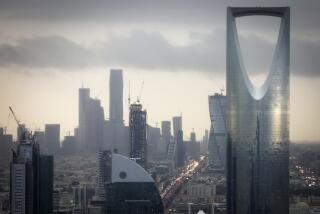Malaysia Sees Folly of Lofty Goals
- Share via
KUALA LUMPUR, Malaysia — After a year that most Malaysians would like to forget, it almost seemed like old times. The skies were blue, making last summer’s fire-induced haze but a dim memory, and for the first time in months people were daring to utter the words “economic recovery.”
The country’s currency, the ringgit, and its minuscule stock market were rising from basement lows. The new 518-room Marriott hotel, where representatives of the French communications giant Alcatel had gathered, didn’t have a single vacancy.
On the outskirts of the capital, 20 international software and computer executives were praising their beaming host, Prime Minister Mahathir Mohamad, as they toured the yet-to-be-completed Multimedia Super Corridor. Malaysia hopes the high-technology zone will be Asia’s answer to Silicon Valley.
A few days earlier, the Far Eastern Economic Review had released a poll showing that 79% of regional business executives did not think the Asian economic “miracle” was dead, although there was disagreement about when its recovery would begin. Of the 10 countries polled, confidence was highest in Malaysia and Singapore.
But Southeast Asia is hardly out of the woods. And although Malaysia has done some belt-tightening, it has not abandoned its pricey dream of upstaging Singapore as Asia’s premier business center.
“We have been too ambitious for a country of 20 million,” said Azmi Setapa, senior research fellow at the Malaysian Institute of Economic Research, an independent think tank. “We tried to grow beyond our growth potential.”
A consensus appears to be emerging among economists that Malaysia would be well served by trying to think small for a while.
In the past, only superlatives counted for Mahathir. On an abandoned racetrack in Kuala Lumpur, the capital, Malaysia constructed the world’s two tallest buildings. It started work on the world’s longest building (a seven-mile shopping and office mall); the world’s most advanced symphony hall; and the world’s most modern airport.
When the economic crisis hit, Mahathir shunned an International Monetary Fund bailout as “economic colonialism.” He alternately blamed the crisis on currency manipulators and a Jewish conspiracy. He so shook investor confidence with his series of outlandish comments that the ringgit plunged with each new utterance.
Mahathir has toned down his rhetoric and ordered changes. The budget has been cut 20%, senior government salaries by 10%. Free meals for bachelor police officers have ended. Malaysians are being urged to vacation at home instead of abroad. Several major projects have been canceled or put on hold, leaving construction cranes to stand idle on Kuala Lumpur’s skyline.
The transformation of Kuala Lumpur into a modern, glitzy city was so sudden, and last year’s loss of investor faith in Malaysia so quick, that many Malaysians appeared to have lost confidence in themselves. “They used to say we couldn’t do anything wrong,” a businessman lamented. “Now they say we can’t do anything right.”
Although the people’s confidence in Mahathir also appears to have been jarred, Western and Asian economists say they believe that Malaysia is in a better position than Thailand or Indonesia to begin the process of economic recovery.
Malaysia has not suffered from a serious foreign-exchange shortage, and in the last quarter it recorded a trade surplus.
“In many ways, the crisis gives us a welcome opportunity to reassess the way Malaysia has gone,” said Karim Raslan, a writer and attorney. “There are always cycles, and in attempting to defy the cycles, we’ve been guilty of some economic hubris--environmental degradation, gross overbuilding, national inefficiency.
“I think what we’ve learned is that, as a small country, we can’t do everything. We have to concentrate on a few areas of opportunity, and we have to do those things well,” he said.
More to Read
Sign up for Essential California
The most important California stories and recommendations in your inbox every morning.
You may occasionally receive promotional content from the Los Angeles Times.













